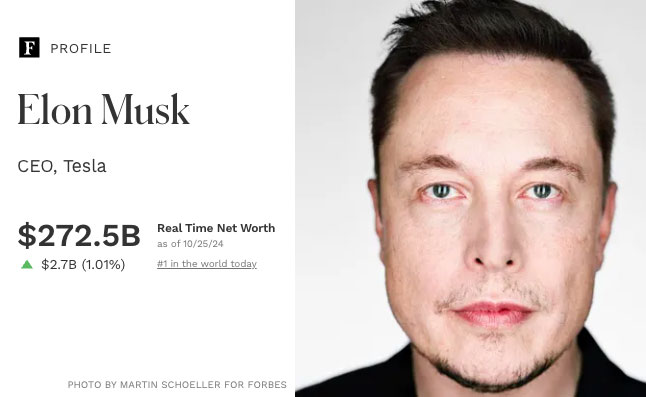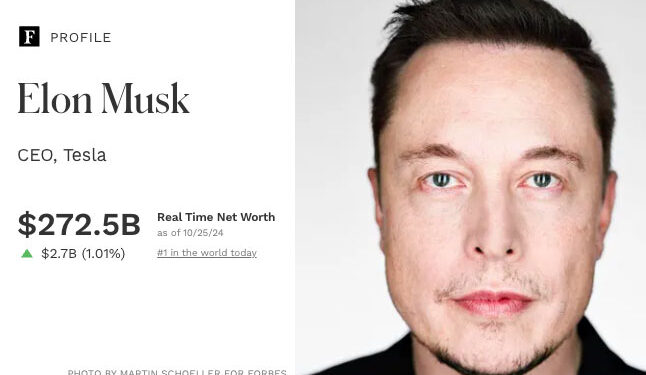Elon Musk, far and away the richest man on the planet, is pouring tens of millions of dollars into efforts to get Donald Trump elected. In addition to his massively valuable promotion of Trump’s messaging on X—an in-kind donation if ever there was one—he reportedly gave $50 million to a group linked to immigrant-hater Stephen Miller, the architect of Trump’s morally abominable family separation policy. And then there’s the legally problematic $100 payments and $1 million lottery-style giveaways he’s been offering registered swing-state voters who sign a petition stating the following:
The First and Second Amendments guarantee freedom of speech and the right to bear arms. By signing below, I am pledging my support for the First and Second Amendments.
Weird, right? But Musk’s return on investment could be huge if Trump prevails and gives him even more power over the very government at whose teat Musk’s companies were nurtured to profitability—and on which they continue to depend. Also, let’s remember, tens of millions for this dude is the equivalent of pocket change for the rest of us. Here’s how much of Musk’s net worth $50 million represents:
0.000183486238532
But what of his philanthropy, you ask? Didn’t Musk sign Bill Gates’ “Giving Pledge,” vowing to give at least half of his wealth to charity?
Yes, he signed up in 2012, for what it’s worth. But he’s running behind on his giving. Consider that, in all of 2022, according to his foundation’s latest tax filing, he gave $160.5 million to charitable causes. Musk made more than that just yesterday—a great deal more.

That’s right, Musk’s net worth increased by $2.7 billion on Friday, according to Forbes’ Real-Time Billionaires, a database that serves as a reminder of just how far our supposedly egalitarian American experiment has devolved into plutocracy—or oligarchy, if you prefer—a situation that founder John Adams had hoped we would avoid (though he wasn’t terribly confident that we would).
Put another way, the amount Musk gave to charity in one year is this much of what he gained in a day:
0.05962962962963
Six percent! Musk, by the way, is now roughly 100 times as rich as he was when he signed the pledge—a scenario Andrew Carnegie would consider grotesque. He’d best start acting more like MacKenzie Scott. Because, as a trusted advisor to industrialist John D. Rockefeller once warned his boss:
You must distribute it faster than it grows! If you do not, it will crush you, and your children, and your children’s children!
Now, Musk did contribute almost $2.3 billion in Tesla stock to his foundation in 2022, earning a fat tax break and locking in a huge, tax-free capital gain at the expense of America’s taxpayers. But our rules governing philanthropy are so toothless that he need only disburse a small fraction of these “charitable” assets. His foundation’s nest egg—roughly $7.2 billion at the end of 2022—generated $309 million in investment income that year, and the value of its unsold assets gained at least $373 million. Yet the amount it gave to charity was about the same as the previous year.
Federal law requires private foundations to spend down 5 percent of their assets annually (which includes overhead). Musk’s 2022 obligation was about $358 million—he didn’t give even half that. The government lets foundations average their disbursements over five years, but he’ll have to pick up his pace considerably.
Lest you were hoping the Musk Foundation’s tax documents would reveal sinister causes to which he may have donated, sorry to disappoint. His public giving is unobjectionable. What you have to watch out for, though, is the transfers to donor-advised funds. His foundation has, since 2018, has moved more than $75 million over to a fund at Fidelity Charitable. For some unfathomable reason, the government lets such transfers count toward a foundation’s mandatory charitable payout.
Donor-advised funds are even more problematic than private foundations—although both cost taxpayers a fortune and are, as I explained in our must-read American Oligarchy issue, profoundly undemocratic. Not only are the creators not obligated to dole out a minimum of their assets each year, they are not obliged to reveal whom they are giving to. It’s dark money, in other words— convenient for anyone who wants to give secretly to odious nonprofits, including groups willing to subvert the democratic process if it will help put a certain candidate back in the White House.







